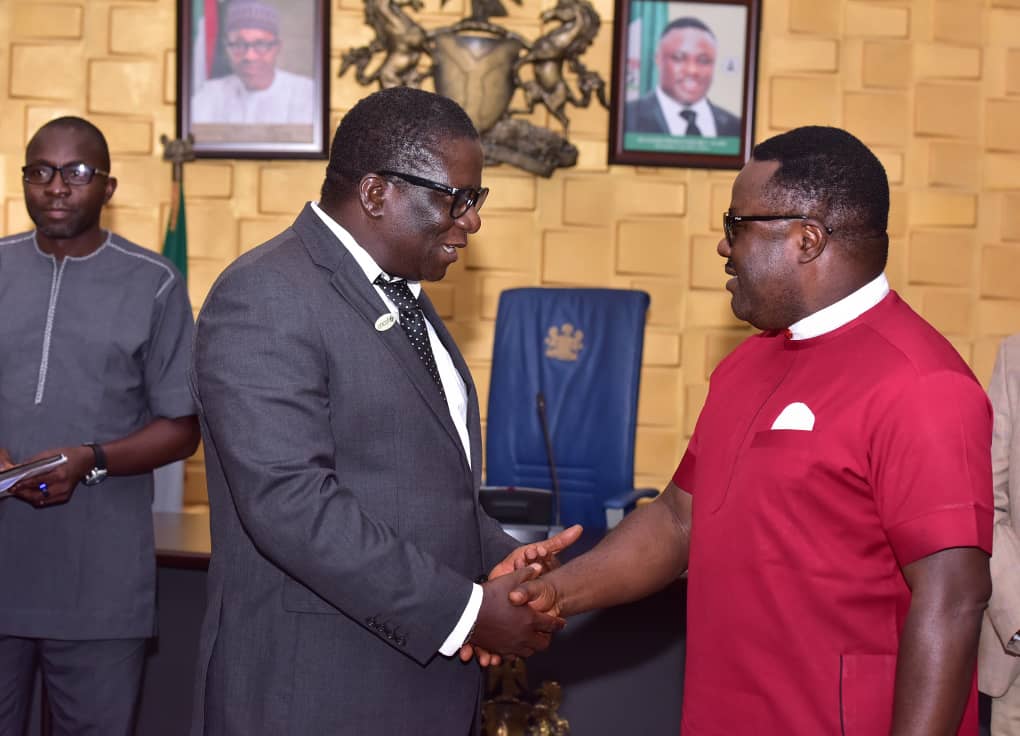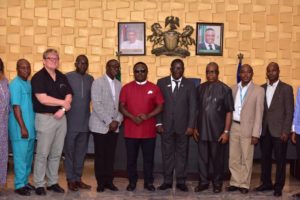By Efa Sunday, Government House Correspondent
Cross River State Government on Tuesday reaffirmed its commitment to the Water Supply Sanitation and Hygiene (WASH) programme, just as it has also made a commitment to ensure that the State becomes the first in Nigeria to attain the Open Defecation Free status.
The State Governor, Sen. Ben Ayade made the commitment when he received a delegation from UNICEF led by Dr. Ibrahim Khalil Conteh, Chief of UNICEF Field Office.
Speaking, Ayade who enumerated the benefits of portable water, sanitation and hygiene in Africa, said “We gave a commitment on a global stage ‘Mandela 100’, where Cross River State made a commitment that we will provide the sum of three million dollars annually for the next five years, in support of the WASH (Water Supply Sanitation and Hygiene) programme.
“That commitment was audacious, it was driven by a very strong philosophy because we know the relevance of water. Water is life, and therefore if you can fix water you have fixed life, if you fix water you have fixed health, if you fix health you have fixed productivity, if you fix productivity you have fixed the economy.
“And I’m making again another good commitment that we will be the first State in the Nigeria that will have 100 percent Open Defecation Free status. It’s a commitment that I am giving now, and I will uphold it with every fibre of my being. In making this commitment I am conscious of the financial implication.
“It is against that arrogance of faith that we have signed and have made available a set aside sum of five hundred million naira, also a sum of two hundred million was set aside in RUWASA in commitment to the WASH programme. So approximately two million dollars out of three million dollars has been committed in line with our declaration”. He said.
The State Governor went further to explain that eighty percent of diseases in Africa are water related. “Let me thank you for all the various successes you’ve achieved in this water, sanitation and hygiene sector. Eighty percent of diseases in Africa are water related. Of these diseases, the greatest and the most implicated source of disease are as a result of indiscriminate defecation in bush, and around the neighbourhood. Which is accelerated if there’s a massive rain fall and leads to erosion taking all of these faeces to the nearby water source.
“Sadly, the African institution is so bad that at the head stream is a source of defecation and at the down stream is a source of drinking water. This is the characteristic story of most of the African settlements. And therefore the choice of UNICEF, World Bank and all the funding agencies focusing on water and sanitation as a critical issue in Africa, it’s upright, it’s obvious it’s necessary, it’s a life saving notion”. He concluded.
Earlier, the Chief of UNICEF Field Office, Enugu, Dr. Ibrahim Khalil Conteh, while requesting for the State Government’s support in sustaining the feats achieved so far, added that UNICEF will soon be wrapping up its Water and Sanitation Sector Reform Programme in the State.
His words, “You may be aware that UNICEF has been working with the EU on water and sanitation sector reform programme which started way back in 2006. Since that time, there has been a global outcry on the supply of water, that Nigeria has stand out strongly. As we are going to be wrapping up this sector reform programme.
“We believe that we still have a lot of opportunity to continue supporting, because the gaps are still there in a lot of communities. On the reform programme, we believe we have to put hands together in making a framework so that the gains we have already made will continue bearing fruits”. He said.
Also present at the courtesy visit was representatives from the implementing partner, United Purpose.



Leave feedback about this